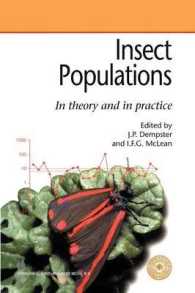- ホーム
- > 洋書
- > 英文書
- > Psychology
Full Description
The urgency and complexity of contemporary social justice issues facing the world today mean that activists, scholars, and storytellers need a readily available compendium of cutting-edge scholarship on media and social justice.
The Oxford Handbook of Media and Social Justice gathers over forty leading scholars and presents a state-of-the-art systematic overview of media and social justice. Representing leading voices across positionalities and perspectives, geographies and generations, meta-theories and methods, and issues and identities, the Handbook explores intersecting identities, social structures, and power networks within media ownership, representation, selection, uses, effects, networks, and social transformation. These theories, methods, and practices expose media and digital divides, polarization, marginalization, exclusion, alienation, invisibilities, stigma, and trivializations. Yet, they also showcase how individuals and communities also have agency through refusal and resistance. Each of the 32 chapters includes a brief history, key concepts, contemporary debates and dialogues, and future directions, and the volume concludes with reflections on resistances, reckoning, and reparative justice.
Connecting critical media scholarship with intersectional feminism, postcolonial/anticolonial theory, Indigenous approaches, queer theory, diaspora studies, and environmental justice frameworks, the Handbook re-envisions the role of media and technology with an inclusive trauma-informed approach to scholarship that is essential for the future of this research.
Contents
Acknowledgements
Contributor Bios
Section A: Introduction
Chapter 1: Perspectives, Positionalities, and Paradigms in Media & Social Justice Scholarship
-Omotayo O. Banjo and Srividya Ramasubramanian
Section B: Approaches and Analytic Frameworks
Chapter 2: Political Economy of Communication in the Digital Platform Era
-Dal Yong Jin
Chapter 3: The Limits of Diversity and Popular Anti-Racism: The Need for Reparative Justice in the Cultural Industries
-Anamik Saha
Chapter 4: Critical Media Effects: A Framework for Bridging Critical Cultural Communication with Media Effects Research
-Srividya Ramasubramanian and Omotayo O. Banjo
Chapter 5: Black Audiences and Media Resistance
-David Stamps
Chapter 6: "How Do You Shift That?": Dialoguing Social Justice, Activism, and Black Joy in Media Studies
-jas l. moultrie and Ralina L. Joseph
Chapter 7: Latine Media Studies: From Near Omission to Radical Intersectionality
-Angharad N. Valdivia
Chapter 8: Queer of Color Approaches to Critical Cultural Media Studies
-Keisuke Kimura and Shinsuke Eguchi
Chapter 9: Queer and Transgender Media Studies
-Erique Zhang and Thomas J. Billard
Chapter 10: Digital Religion and the Negotiation of Gender/Sex Norms
-Ruth Tsuria
Chapter 11: Critical Disability Media Studies
-Katie Ellis and Jessica Keeley
Section C: Methods and Meaning Making
Chapter 12: Critical Discourse Analysis
-Marissa Doshi
Chapter 13: Data Justice: The Role of Data in Media and Social Justice
-Srividya Ramasubramanian, Shannon Burth, and Minnie Macmillian
Chapter 14: Justice Informatics, Justice for Us All: Liberation from Techno-Ideology
-Jasmina Tacheva and Tanya Loughead
Chapter 15: Researching Closed Fields: What We Can Learn from Analyzing So-Called Constrained, Inaccessible and Invisible Media Contexts
-Hanan Badr
Chapter 16: Digital Archives and Unexpected Crossings: A Data Feminist Approach to Transnational Feminist Media Studies and Social Media Activism
-Ololade M. Faniyi & Radhika Gajjala
Section D: Resistance and Revisioning
Chapter 17: Mediated Socioeconomic Injustice: Representations of Poor and Working Class People in Mainstream Media
-Charisse L'Pree Corsbie-Massay
Chapter 18: Challenging Caste Hierarchies in Tamil Cinema
-Swarnavel Eswaran
Chapter 19: Media Representations, Incarceration, and Social Justice
-Adam Key
Chapter 20: Heroes of the Border: Using Counternarratives to Break Border Stereotypes and Create Superhero Narratives
-Anthony R. Ramirez
Chapter 21: Media Creation and Consumption as Activism among African Transnational and Diasporic communities
-Omotayo O. Banjo and Tomide Oloruntobi
Chapter 22: Subaltern Digital Cultures: Precarious Migrants on TikTok
-Elisha Lim, Satveer Kaur-Gill, and Krittiya Kantachote
Chapter 23: Media & Mental Health Interventions among Migrants: Addressing the Disparities
-Rukhsana Ahmed and Seulgi Park
Chapter 24: Health Media Activism: Latin American Organizing in Response to Feminicides
-Leandra Hinojosa Hernandez
Chapter 25: Using Artificial Intelligence to Address Health Disparities: Challenges and Solutions
-Kelly Merrill Jr.
Chapter 26: Pedagogies of Resistance - Social Movements and the Construction of Communicative Knowledge in Brazil
-Paola Sartoretto
Chapter 27: Emboldening Democratic Pedagogies about Media and Justice through Critical Media Literacy and Peer Teaching
-Andrea Gambino and Jeff Share
Chapter 28: Alternative Cultures of Resistance and Collective Organizing in the Platform Economy
-Cheryll Ruth Soriano
Chapter 29: LGBT Activism, Social Media and the Politics of Queer Visibility in Ghana
-Godfried A. Asante, Wunpini Fatimata Mohammed, and Ama B. Appiah-Kubi
Chapter 30: Indigenous Environmental Media Activism in South Asia
-Uttaran Dutta
Chapter 31: Indigenous Media Organizing
-Mohan J. Dutta and Christine Elers
Section E: Conclusion
Chapter 32: The Future of Media & Social Justice: Resistances, Reckoning, and Reparative Justice
-Srividya Ramasubramanian and Omotayo O. Banjo
Index







